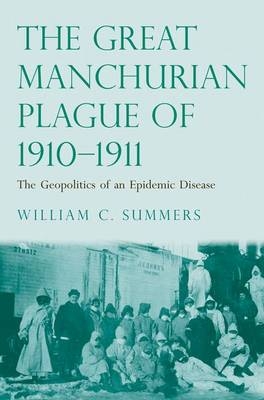
The Great Manchurian Plague of 1910-1911
The Geopolitics of an Epidemic Disease
Seiten
2012
Yale University Press (Verlag)
978-0-300-18319-1 (ISBN)
Yale University Press (Verlag)
978-0-300-18319-1 (ISBN)
- Titel z.Zt. nicht lieferbar
- Versandkostenfrei innerhalb Deutschlands
- Auch auf Rechnung
- Verfügbarkeit in der Filiale vor Ort prüfen
- Artikel merken
When plague broke out in Manchuria in 1910 as a result of transmission from marmots to humans, it struck a region struggling with the introduction of Western medicine. This book covers the complex political and economic background of early twentieth-century Manchuria and then moves on to the plague itself.
When plague broke out in Manchuria in 1910 as a result of transmission from marmots to humans, it struck a region struggling with the introduction of Western medicine, as well as with the interactions of three different national powers: Chinese, Japanese, and Russian. In this fascinating case history, William Summers relates how this plague killed as many as 60,000 people in less than a year, and uses the analysis to examine the actions and interactions of the multinational doctors, politicians, and ordinary residents who responded to it.
Summers covers the complex political and economic background of early twentieth-century Manchuria and then moves on to the plague itself, addressing the various contested stories of the plague’s origins, development, and ecological ties. Ultimately, Summers shows how, because of Manchuria’s importance to the world powers of its day, the plague brought together resources, knowledge, and people in ways that enacted in miniature the triumphs and challenges of transnational medical projects such as the World Health Organization.
When plague broke out in Manchuria in 1910 as a result of transmission from marmots to humans, it struck a region struggling with the introduction of Western medicine, as well as with the interactions of three different national powers: Chinese, Japanese, and Russian. In this fascinating case history, William Summers relates how this plague killed as many as 60,000 people in less than a year, and uses the analysis to examine the actions and interactions of the multinational doctors, politicians, and ordinary residents who responded to it.
Summers covers the complex political and economic background of early twentieth-century Manchuria and then moves on to the plague itself, addressing the various contested stories of the plague’s origins, development, and ecological ties. Ultimately, Summers shows how, because of Manchuria’s importance to the world powers of its day, the plague brought together resources, knowledge, and people in ways that enacted in miniature the triumphs and challenges of transnational medical projects such as the World Health Organization.
William C. Summers is professor of the history of science and medicine, molecular biophysics and biochemistry, and therapeutic radiology at Yale University.
| Zusatzinfo | 13 b-w illus. |
|---|---|
| Sprache | englisch |
| Maße | 140 x 210 mm |
| Gewicht | 386 g |
| Themenwelt | Geisteswissenschaften ► Geschichte ► Regional- / Ländergeschichte |
| Geschichte ► Teilgebiete der Geschichte ► Kulturgeschichte | |
| Studium ► Querschnittsbereiche ► Epidemiologie / Med. Biometrie | |
| Studium ► Querschnittsbereiche ► Geschichte / Ethik der Medizin | |
| ISBN-10 | 0-300-18319-4 / 0300183194 |
| ISBN-13 | 978-0-300-18319-1 / 9780300183191 |
| Zustand | Neuware |
| Haben Sie eine Frage zum Produkt? |
Mehr entdecken
aus dem Bereich
aus dem Bereich
der stille Abschied vom bäuerlichen Leben in Deutschland
Buch | Hardcover (2023)
C.H.Beck (Verlag)
23,00 €
vom Mittelalter bis zur Gegenwart
Buch | Softcover (2024)
C.H.Beck (Verlag)
12,00 €


